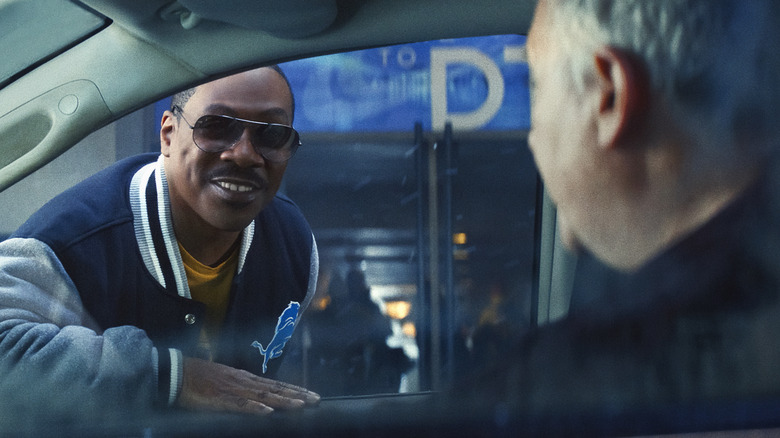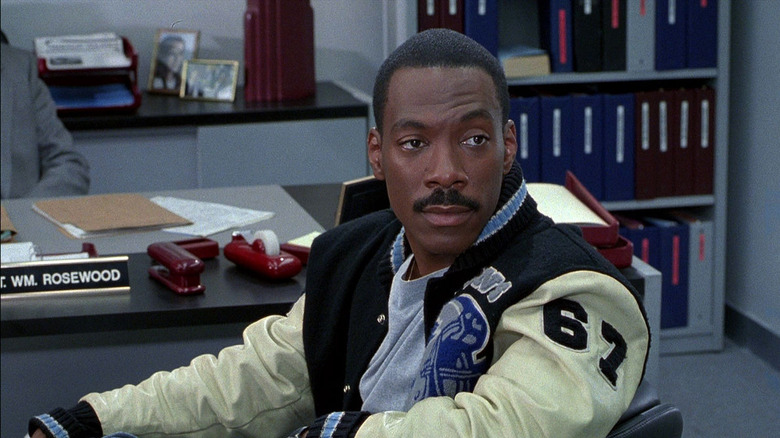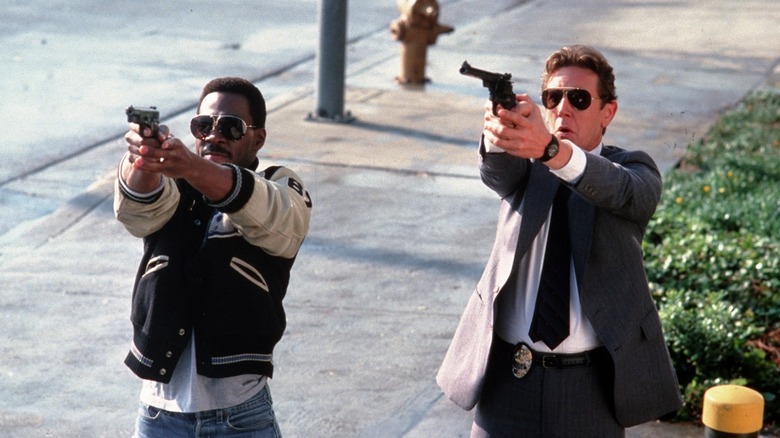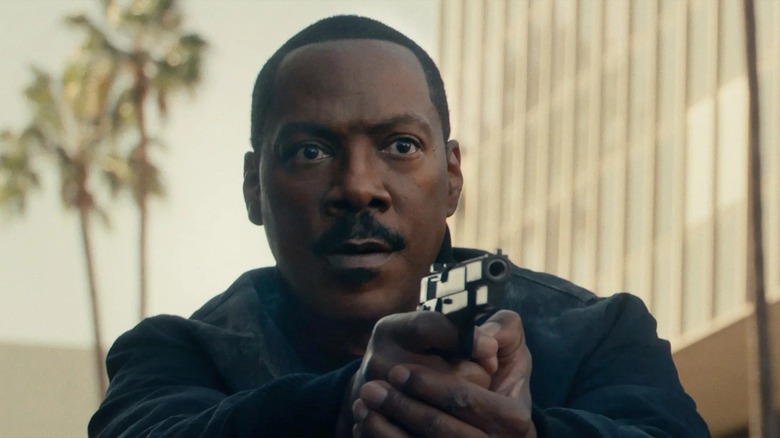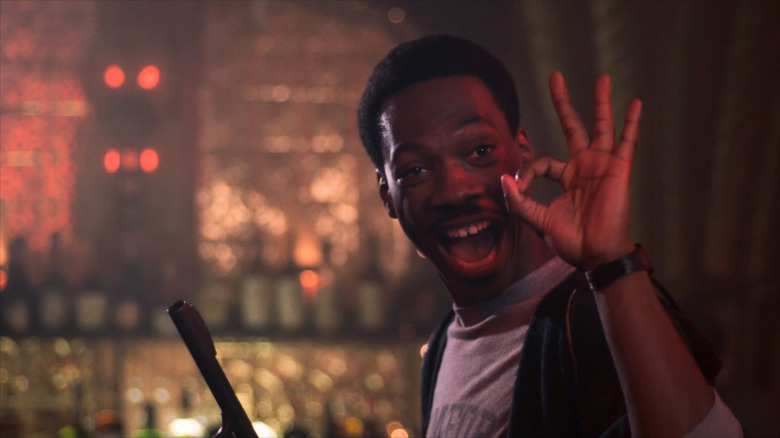Every Beverly Hills Cop Movie, Ranked From Worst To Best
Although some younger audiences may not realize it, Eddie Murphy has been one of the biggest, most famous movie stars on the planet for more than 40 years. Part of the gap of knowledge for Gen Z might be the reality that Murphy stepped away from the limelight aside from a couple of notable titles that went straight to streaming over the last few years, such as the Amazon Original film "Coming 2 America," over the last decade. But Murphy is roaring back on screen this week with a vengeance by returning to one of his most recognizable and beloved characters in the new Netflix action comedy "Beverly Hills Cop: Axel F." With his return to this now-40-year-old character in mind, it's worth looking at the whole "Beverly Hills Cop" series. The 1984 original is one of the seminal action comedies ever made, but how does the rest of the franchise hold up? Let's look at the four-film "Beverly Hills Cop" franchise and rank them, worst to best.
4. Beverly Hills Cop III
It really shouldn't have been this way. On the surface, many of the ingredients for a successful film exist in the 1994 action comedy "Beverly Hills Cop III." Murphy was returning to one of the roles that made him famous beyond even his work on "Saturday Night Live" in the early 1980s. Not only that, but he was reuniting with director John Landis, whose own career had plenty of successes with Murphy, including "Trading Places" and "Coming to America." The premise of the third Axel Foley adventure also feels like a bit of a nod to another famous franchise, the "Vacation" series starring fellow "SNL" alum Chevy Chase, as Axel has to investigate a counterfeiting ring tied to a theme park called Wonder World, which is definitely not meant to inspire connections to Disneyland and its ilk. And because Landis' own predilections in his films was to do winking in-jokes and feature cameos from other members of the film industry, it made only perfect sense for him to make a new movie where Murphy would have to rub shoulders with the Hollywood elite. But too often, a concept and its execution don't match up. Such was the case with the best-left-forgotten "Beverly Hills Cop III."
Some of the signs of trouble are there even before the film truly starts. Not all of the cast returned — though Murphy is, of course, present alongside Judge Reinhold, they're only joined by Bronson Pinchot as the flamboyant Serge among the returning players. Though neither John Ashton as Taggart nor Ronny Cox as Bogomil are the most hilarious characters in the series, their absence felt notable. Even Harold Faltermeyer, who composed the quintessential and iconic "Axel F" synth theme that's so well-known, didn't return as the film's composer, replaced by Nile Rodgers. And although Murphy is no stranger to franchises that run across decades (think about how he's recently referred to recording dialogue for an upcoming fifth "Shrek" film), there was something particularly cash-grabby about "Beverly Hills Cop III." You don't just have to take this writer's word for that conclusion. Instead, you can read it straight from ... Murphy himself. In a Rolling Stone interview in 1989, when asked about doing a third installment, Murphy reportedly said, "...if I do a 'Cop III', you can safely say, 'Ooh, he must have got a lot of money!" (He did — stories of the film's production delays note that $15 million of the film's ballooning budget was his salary.)
Expanding financials or not, the end result of "Beverly Hills Cop III" is turgid and stagnant. It would arguably count as a searing hot take for any ranking of the franchise to not list "III" as the worst of the series, since Landis and Murphy in later years would acknowledge that it wasn't an impressive effort. (It's also telling that in the latest entry, "Axel F," there is a brief nod to the third film as another character tells Axel his adventures in 1994 weren't his finest hour.) Though Murphy initially seemed higher on the film when promoting it, he rightly notes a big part of the problem now: "Axel didn't have any skin in the game." It's not that Axel Foley needs to be the tough-as-nails supercop for whom things just got personal to make a memorable story. But shoving Axel Foley into a riff on the Disney theme-park enterprise with references galore is less exciting than it sounds, and watching the film, it's as if everyone involved understands inherently in the moment how bad things have gotten.
3. Beverly Hills Cop II
It's kind of wild that the first sequel Eddie Murphy made wasn't to his first film, "48 Hrs." Although there was a sequel to that film eventually, Eddie Murphy donned his Detroit jacket once more in 1987 with "Beverly Hills Cop II." As with the third film in the series, the pieces were in place for a surefire hit. Although the first film's director, Martin Brest, had moved on, he was replaced behind the camera by one of the hottest names in the business in the mid-1980s, Tony Scott. (Scott was fresh off the massively successfully "Top Gun," released in the summer of 1986 and also produced by Don Simpson and Jerry Bruckheimer.) But while Scott had earned his bona fides, he was not then (nor later) known as a director with a propensity for comedy. If the original "Beverly Hills Cop" sometimes treats its own lead as a form of comic relief, then the second film really leans a lot harder on that notion, sometimes to its detriment. "Beverly Hills Cop II" is a step down from its predecessor, both because following that act would be next to impossible and because it tried a little too hard to be edgy.
That former aspect is really what stands out when approaching "Beverly Hills Cop II" in 2024. In many ways, the film is a perfect example of how Hollywood approaches sequels to lightning-in-a-bottle successes. The assumption is simple: the audience wants more of the same. And much of the film does offer that. Once more, Axel travels from Detroit to Beverly Hills. Once more, he runs afoul of the police brass, while also winning over folks like Billy Rosewood (Reinhold) and Taggart (Ashton), if somewhat begrudgingly. And once more, there's a personal touch to the major crime, as Bogomil (Ronny Cox) is shot and wounded while working a case of high-class robberies; it's only after that attack that Axel heads West. But more of the same also means doubling down on some of those already-mentioned aspects, just because. So this time, with Bogomil not as present, there's additional police brass who all but loathe Foley simply because he doesn't do things the right way, adding unnecessary complications to what could be an easier case to solve. And there's more violence, partially represented by the visually arresting henchwoman played by Brigitte Nielsen.
And, as one of the film's three editors noted in an interview decades later, "It wasn't a comedy." Tony Scott very much delivers the mid-1980s style, a blend of sweat and neon colors and synth music that defines so many films of the decade. But "Beverly Hills Cop" worked so well not because it was an intense action picture, but because it blend two genres seamlessly without leaning too hard on one or the other. Put it another way: no one making the original "Beverly Hills Cop" knew in advance how huge of a hit it could be. But the people who made "Beverly Hills Cop II" had a lot of big expectations to live up to. And the Eddie Murphy of 1984 was slightly less of an untouchable star than the Eddie Murphy of 1987. "Beverly Hills Cop II" did make a ton of money at the box office, netting nearly $300 million worldwide (at a time when those numbers were rare). But the bloom was off the rose. This movie is certainly better than the third film; it just couldn't catch lightning in a bottle twice.
2. Beverly Hills Cop: Axel F
It's not that Eddie Murphy hasn't attempted to reclaim his movie-star bonafides in the last twenty years, but many of the attempts just haven't been that successful. (Even his supporting role in "Tower Heist" with a bevy of A-Listers is mostly forgotten now.) And while the Amazon Original "Coming 2 America" had a groundswell of fan support, or at least hope, the film itself wasn't nearly as funny as the 1988 original and trafficked almost entirely in reminding us about that much better story. So it's not wrong to be dubious that a Netflix-released sequel to "Beverly Hills Cop" forty years after the original and thirty years after the most recent (and most disliked) entry could be any good. But it's nice to be pleasantly surprised, and such is the case with "Beverly Hills Cop: Axel F." There's a fun little irony in the existence of this film, when you really think about it. If "Beverly Hills Cop III" hadn't been such an immediate flop with critics and audiences, this film may not have existed. (There are a few different fascinating what-if questions in Eddie Murphy's career, such as "What if he'd won the Oscar for his work in 'Dreamgirls'?" But that's a different discussion.)
Strangely, it's good that the third film did do so badly, because who knows if "Axel F" would've worked half as well; there's a benefit in the absence of Axel Foley from the big screen making our hearts grow fonder. The same is true of Murphy himself, who took a large chunk of the 2010s off from starring in motion pictures. Though he's eased back with films like the charming and shaggy "Dolemite Is My Name" and the less charming "You People," Murphy really hasn't felt quite as comfortable on screen as he does when playing Detroit cop Axel Foley. As was the case with the original "Beverly Hills Cop," "Axel F" has a straightforward enough premise in which Axel travels to the West Coast for personal reasons. This time, it's not a friend who's died, but his estranged daughter (Taylour Paige) who's in trouble. She's a fiercely determined lawyer who's being threatened for representing an accused cop killer, and even though Axel has a distant relationship with her, he can't help but stick his nose in to simultaneously help her out and remind himself that he can still do this cop stuff.
Naturally, there are new changes at the Beverly Hills Police Department, such as how his daughter's ex (Joseph Gordon-Levitt) represents a more modern, less aggro cop. (The flip side is Kevin Bacon's slick police leader, who acts like he and Axel have had similar experiences, but we all know they haven't.) Of course, some things — like Axel's old pals Billy (Judge Reinhold) and Taggart (John Ashton) — never change. When you look at this film alongside other legacy sequels like "Creed" and "Star Wars: The Force Awakens," which are as much about cheerful reminders of the nostalgic past as they are about telling new stories, it stands up surprising well. There are more than a few nods to the reality that the original actors like Murphy are past 60 now, but director Mark Molloy delivers some effective action setpieces, and Murphy's return to one of his earliest roles shows that he hasn't lost a step. "Beverly Hills Cop: Axel F" is not some groundbreaking masterpiece, but it is a confident, well-paced, exciting reminder of what a solid action-comedy can look like. It's good to have Axel back.
1. Beverly Hills Cop
Just as it would be a searing hot take to place "Beverly Hills Cop III" anywhere but last on this ranking, the same is true of the 1984 original. "Beverly Hills Cop" was an undeniable smash when it arrived at the tail end of that year, making so much money that (adjusted for inflation) it's the highest-grossing R-rated film ever released in the United States. Add to that the fact that it netted an Oscar nomination for its script, and its soundtrack featured immediate hits like "The Heat Is On" and the synth theme that's synonymous with mid-80s action films; you really only get one or two movies like this a year, if you're lucky, that just become massive beyond belief. Eddie Murphy had started his film career with two very strong hits, in the form of "48 Hrs." and "Trading Places," each of which made clear that the innate charisma and charm the young actor displayed on "Saturday Night Live" was no fluke. It's not so much that "Beverly Hills Cop" was a third-time's-the-charm situation; instead, this instant phenomenon of a movie proved that Murphy's film stardom would be unavoidable for decades.
Murphy wasn't the original star the studio had in mind for this story of an outrageous young Detroit detective traveling to sunny and ritzy Beverly Hills to investigate a murder. (A number of less comic A-Listers were involved or asked, but it was Sylvester Stallone who nearly played Axel Foley and had tried to rewrite the script to fit his style.) Although he was relatively untested as an action lead (as opposed to being a co-lead with actors such as Dan Aykroyd and Nick Nolte), Murphy is basically the perfect person to bring to life the fish-out-of-water idea, helping make Axel Foley one of the most memorable modern movie characters. What may be most fascinating about "Beverly Hills Cop" is not the ground it broke, partly because it didn't break a ton of ground outside of presenting its renegade cop as a young Black man (and not in a straight-up blaxploitation film like "Shaft"). It's that this movie simply found the right combination of familiar tropes to seem fresh, not stale. Brash cops who ignore their grumpy superiors weren't new, nor was Murphy in a Paramount-distributed action film.
"Beverly Hills Cop" may not have felt as much at the time, but 40 years later, it strongly resonates as the kind of movie studios don't typically make anymore. (As pleasing as it is for the latest entry to exist, the fact that Netflix is not releasing it in theaters on a major holiday weekend is further proof of how skittish studios are these days.) Murphy's rat-a-tat style of dialogue runs up perfectly against the straitlaced Beverly Hills police force as well as the scummy art dealer Axel has to take down to gain vengeance for a dead friend. And director Martin Brest (who would later direct an absolutely perfect buddy comedy, "Midnight Run") does an excellent job of balancing the '80s-style action-movie grit with Murphy's shrewd and buoyant performance. Produced by Don Simpson and Jerry Bruckheimer, "Beverly Hills Cop" not only solidified the reality that Eddie Murphy was a huge movie star, but it also delivered the simple, straightforward goods, combining a genuinely compelling mystery with a hilarious lead and setup. Forty years later, there's a reason why this movie is held up so high in the action-genre pantheon.
